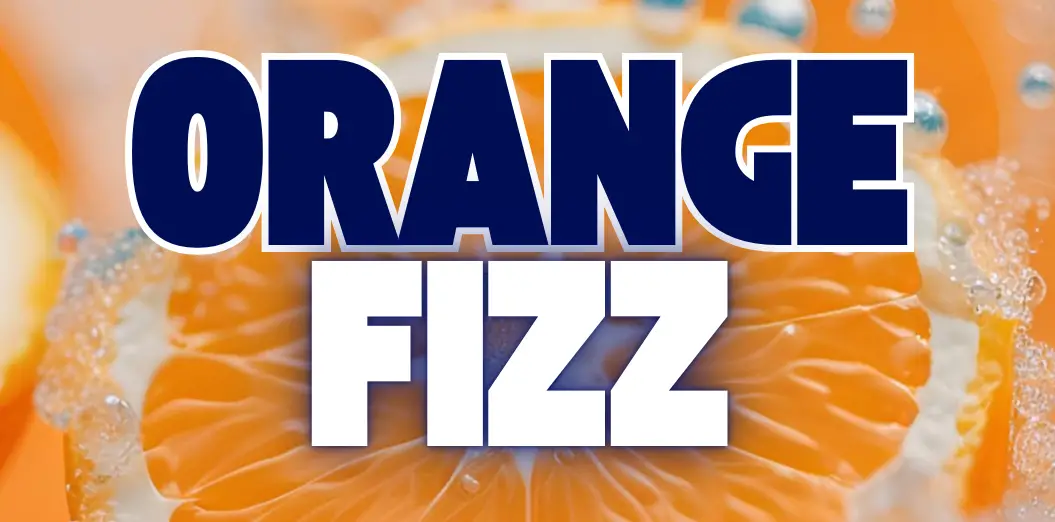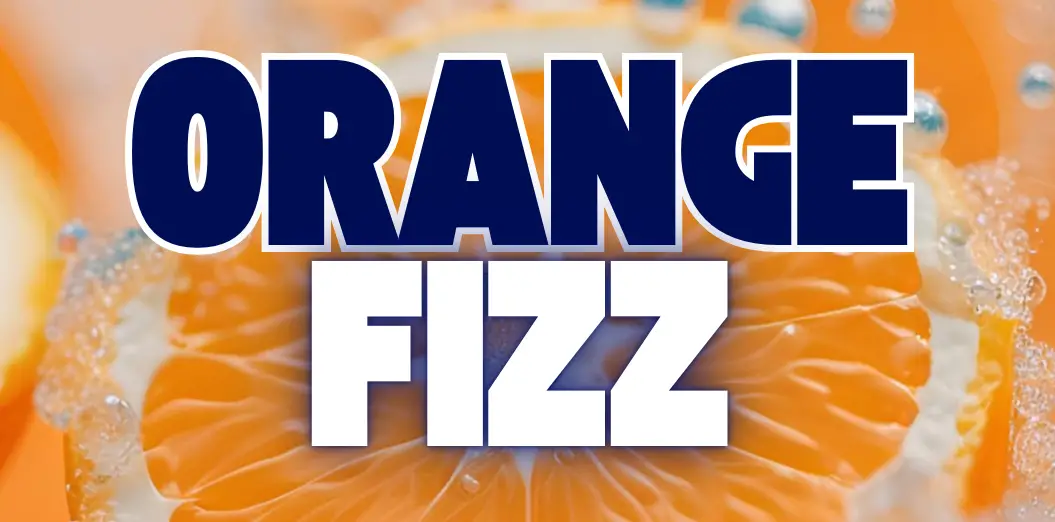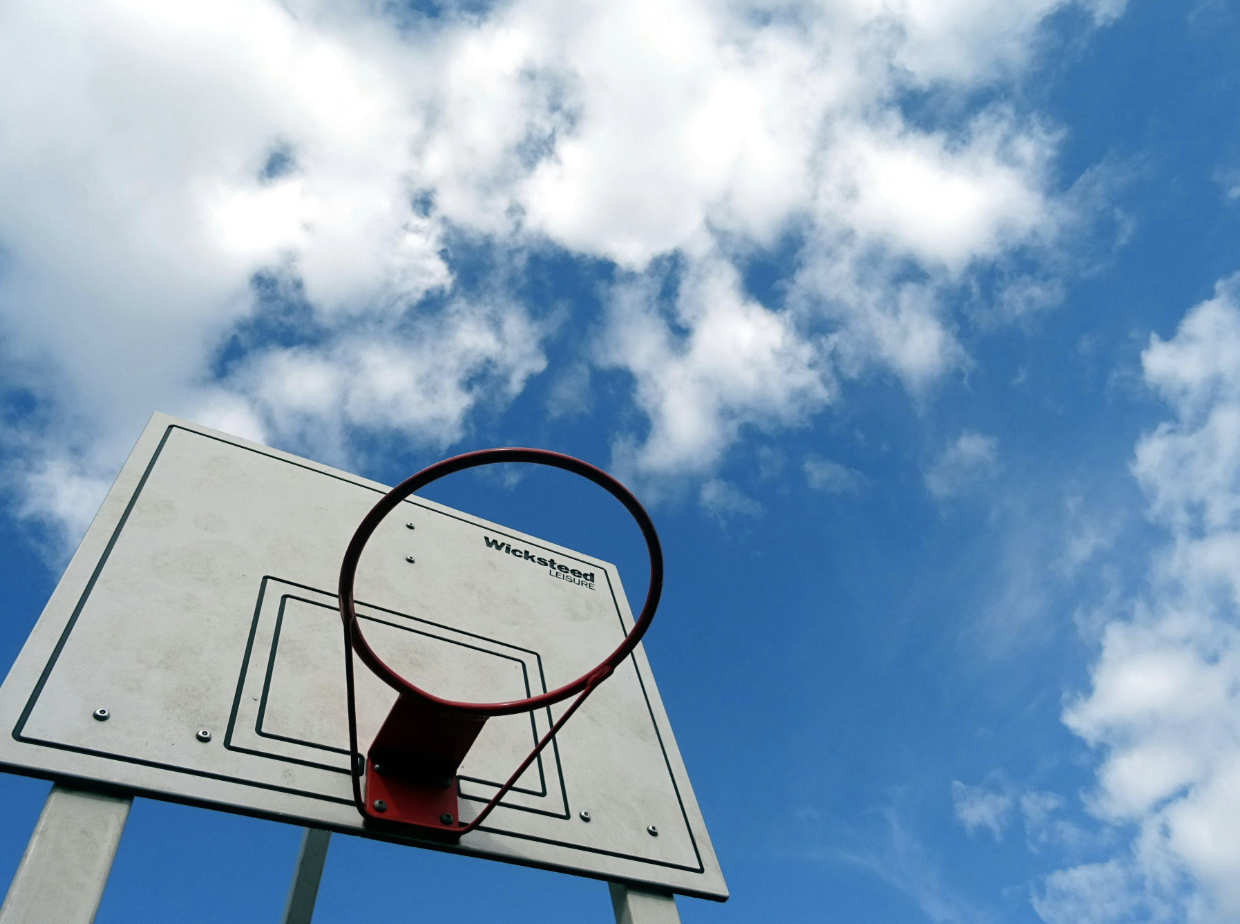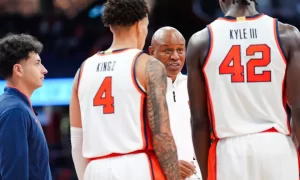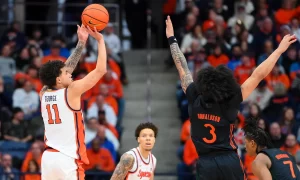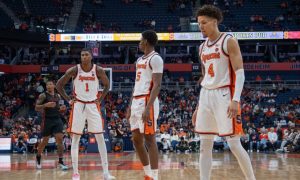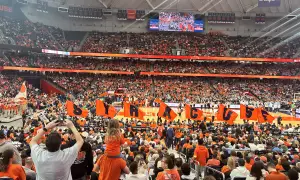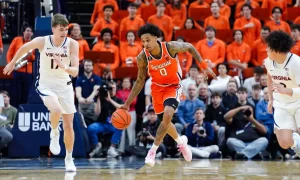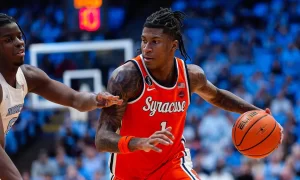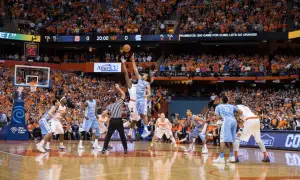Just like in the rest of college sports, Syracuse basketball is starting to shift towards an international recruitment model. A prime example is Ibrahim Souare, a 6-foot-9 forward from Conakry, Guinea, who joined Syracuse after a freshman year at Georgia Tech. Souare’s stats — 2.8 points and 3.6 rebounds per game over 17 minutes — aren’t eye-popping, but he does bring something more fundamental to Syracuse: a growing global footprint, especially from Africa.
The Orange have been active in the transfer portal, and the addition of Souare specifically helps fill a gap left by Eddie Lampkin and Naheem McLeod departing Syracuse’s frontcourt. However, Syracuse is not solely focused on roster construction pieces. The acquisition of Souare portrays Syracuse’s desire to actively recruit players from a talent pool that is more fierce and competitive than ever before.
How international scouting is changing the game
The recruitment of international players like Souare reflects a significant shift in college basketball scouting. Colleges are no longer solely relying on domestic high school and AAU circuits; instead, they are proactively establishing international scouting networks, partnering with foreign academies, and closely monitoring global tournaments. Programs such as Basketball Without Borders and NBA Academy Africa exemplify initiatives that have brought previously overlooked talent into the spotlight.
This globalization of talent has transformed how fans engage with college basketball. Games have become platforms to showcase diverse talents and cultural narratives, enriching the sport’s storytelling. Fans and analysts are now more invested in players’ backgrounds and developmental journeys, adding depth to their viewing experience.
In East Africa, particularly Tanzania, this evolution coincides with a surge in basketball’s popularity. The accessibility of NCAA games through digital streaming has enabled Tanzanian fans to follow players from their region more closely. This increased visibility has fostered a deeper connection to the sport and its international players.
The rise of online sports betting in Tanzania has further enhanced fan engagement, and the market in Tanzania is projected to reach US$9.80 million by the end of 2025, with an expected annual growth rate of 10.18% through 2029.
The convenience of mobile betting platforms, coupled with real-time updates and live odds, allows fans to interact with games on a more dynamic level. This interactive experience transforms passive viewership into active participation, as fans make predictions and place bets during live games.
Basketball, in particular, has become a focal point for bettors due to its fast-paced nature and the variety of betting options available, such as point spreads, total points, and live in-play bets. The integration of betting into the viewing experience adds a layer of excitement and personal investment, further deepening fans’ connection to the sport.
A Growing African Influence in NCAA Basketball
There’s no question that the stream of African prospects into the NCAA has been on the rise over the last ten years, especially with players such as Joel Embiid (Cameroon), Precious Achiuwa (Nigeria), and more recently, Yves Missi (Cameroon, Baylor), bringing attention to the continent’s impact on college basketball.
With Embiid’s stunning rise to fame in the NBA, Americans have become familiar with international basketball and subsequently Northeastern Africa’s contribution to it. Through Syracuse, Souare advances the list of international players, which has steadily increased over the years. But his presence speaks to athletes who possess a different level of potential as well as a new wave — those who have already been fundamentally trained through overseas academies and basketball development programs.
Many of these players come through the US via prep schools or international tournaments during their high school years, and the majority seem to be effortlessly adjusting to the relentless pace and intensity of NCAA basketball.
Connections Between NCAA Programs and African Talent
The recent growth of African talent in the various NCAA programs is not an accident. Rather, it reflects deep-seated linkages between American institutions of higher learning and African developmental frameworks.
Changes have occurred, especially in the quality and number of basketball academies in countries like Senegal, Nigeria, and South Sudan. These institutions are often funded by former professional players and other NGOs that provide training, education, and even exposure to the sport.
To most African athletes, the NCAA is not only a dream but also a pathway to building their careers. It offers an opportunity to have a good education, play professional sports, and, in the end, enables them to attain professional aspirations. Admittedly, the journeys require grit, perseverance, and tenacity. However, those who achieve these feats successfully blend the athleticism and discipline unique to every college team.
Syracuse’s Role in the Emerging Global Pipeline
Like many other programs, Syracuse is beginning to capitalize on these networks. While Souare may be the most recent to join, he probably won’t be the last. His recruitment suggests a growing understanding in the Orange coaching staff that the potential breakout star is not bound to local high school gyms. Rather, he could be an academy player living 5,000 miles away, playing on a different continent.
This change is far from a mere footnote for Syracuse supporters. It underscores how the team is changing and expanding. The presence of more African players entering the NCAA alters the narrative; basketball is starting to gain traction in places that, until now, were focused primarily on the NBA or international competitions.
An African fan might watch a game not simply for the outcome, but because they hope to see a player who represents them shared within their language and culture. The new perspective and identity that international players add to the game help to build that hope.
